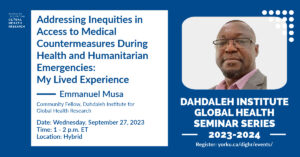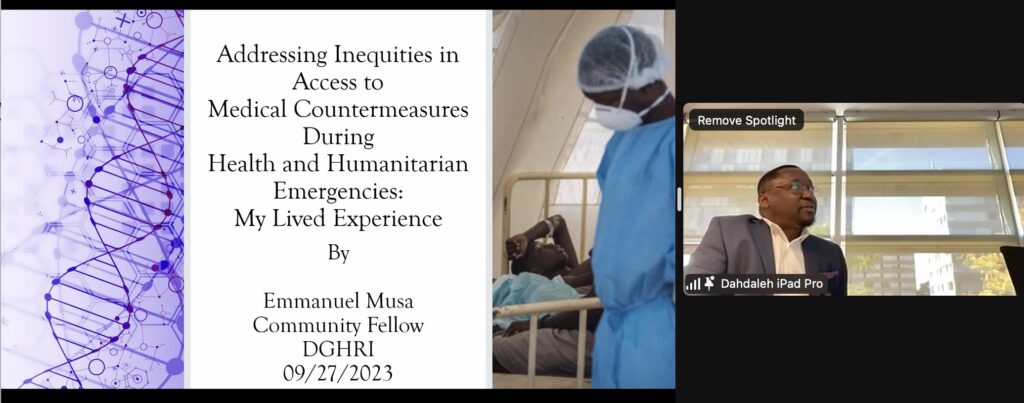Post
Published on October 19, 2023

On September 27, 2023, Dahdaleh community fellow Emmanuel Musa illustrated the consequences when countries do not have access to medical countermeasures (MCMs) – strategies and tools that can be implemented during a wide range of emergencies. Examples of MCMs include vaccination programs, medicine and medical, diagnostic tools, personal protective equipment, enacting public health measures, and decontamination techniques.
During his time as an epidemiologist team lead in Beira, Mozambique, Dr. Musa witnessed the disastrous effects of the 2019 Tropical Cyclone Idai. The cyclone resulted in over 100,000 homes destroyed leaving hundreds of thousands displaced and even more without food, electricity, and access to clean water. According to the UN, it caused an estimated $773 million in buildings, crops, and infrastructure damages. In just two weeks, cholera and diarrhoeal diseases began to spread. Under these circumstances several MCMs were deployed, temporary shelters, medical teams, mental health and psychosocial support, logistics support, an emergency operations centre was established to coordinate resources, expertise, and equipment.
Despite these efforts, not all areas and all citizens were able to access all the resources. Women, children, and the elderly felt overlooked by responding teams. Dr. Musa stated that inequities had to be addressed though integrated approaches that targeted more vulnerable areas. Organizations collaborated with the local governments, NGOs, civil society, and other influential persons to find solutions and spread word about plans to reach everyone. Dr. Musa emphasized the importance of a MCMs communication phased approach and to involve policymakers as much as possible.
Lastly, he shared the key principles of humanitarianism (humanity and impartiality) and the need to build local capacity to improve emergency preparedness. Dr. Musa advocated for the importance of global advocacy and solidarity with a multi-prong approach to equitable access to MCMs. This would require more investment towards affordable MCMs and resource allocation that prioritizes underserved, at-risk areas.
Watch the seminar presentation below:
Connect with Emmanuel Musa
Themes | Global Health & Humanitarianism |
Status | Active |
Related Work |
N/A
|
Updates |
N/A
|
People |
You may also be interested in...
Recap – Rising Heat and Restless Nights: The Impact of Elevated Temperatures on Sleep and Cognition
What is the relationship between sleep, our ability to think clearly, and climate change? This was the question that Dahdaleh faculty fellow Professor Godfred Boateng and Dr. Gabriel John Dusing, who is a Research Fellow, ...Read more about this Post
Recap — A Discussion on Conflict, Humanitarianism, and the Call for a Canadian Peace Museum, with Chris Houston
On October 2, 2024, Dahdaleh community fellow Chris Houston delved into the complexities surrounding war, humanitarianism, and peace. He began by highlighting the International Day of Peace, emphasizing the importance of peace as a fundamental ...Read more about this Post
Check out the SWOT at the UNC Water and Health Conference
The Safe Water Optimization Tool (SWOT) team will be at the upcoming UNC Chapel Hill Water and Health Conference, October 24 to 28, at the University of North Carolina Chapel Hill. James Brown, our field technical ...Read more about this Post



